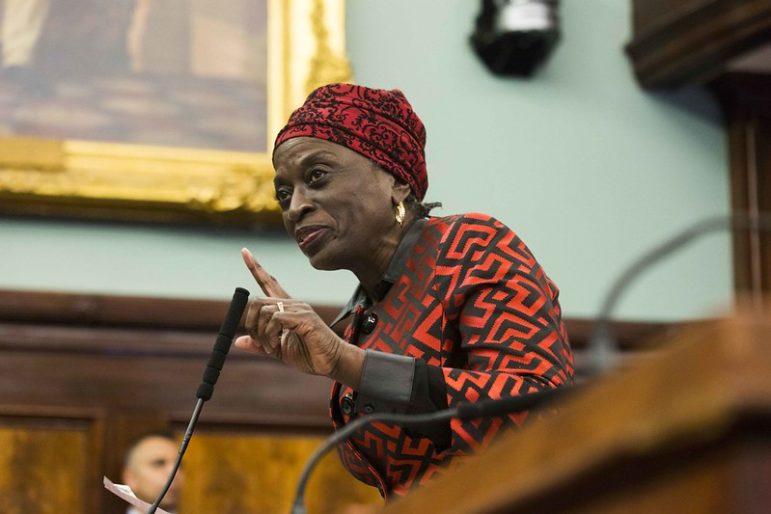
Emil Cohen/City Council
A bill introduced by Councilmember Inez Barron would require the city to alert senior tenants facing eviction of available services and collect information on said tenants, in collaboration with the Commissioner on Human Rights.
In the nearly six years since the de Blasio administration took office, only 3800 new units of senior affordable housing have been created, a Department of Housing Preservation and Development spokesperson testified at a City Council on Thursday.
The hearing, held jointly by the Committee on Aging and Committee on Housing, was a chance for the City Council to gauge how far along the city had come in creating new affordable senior housing and to oversee programs meant to prevent seniors from getting evicted. City officials also provided feedback on several bills introduced by the Council to promote services to seniors facing eviction and retrofit apartments to help seniors age in place.
3000 of the new affordable senior units were developed under a city program called SARA, or Senior Affordable Rental Apartments, which was rolled out in late 2014. That program provides low-interest loans for developers to build new affordable senior housing.
While only 3,800 units have been finished, others are in the pipeline. The administration says that the total senior affordable housing units it has financed through a combination of preservation, retro-fitting and new construction is 8,500. The de Blasio administration has pledged to “create or preserve” 15,000 senior homes and apartments as part of the Housing New York plan that it launched in 2014.
That number does not come close to fulfilling the ever-increasing need: A 2016 report from LiveOn NY found almost 111,000 seniors on waiting lists for an average of seven years for Section 202 housing. An updated LiveOn study from late 2017 estimated that 44,000 seniors were on waitlists for Section 202 in just two community districts on the Upper West Side alone. Section 202 is a program under the federal Department of Housing and Urban Development that finances the development of new supportive housing for people who are 62 and older and low-income.
“I don’t think we have hit the tip of the iceberg of the housing crisis that exists for seniors,” Katelyn Andrews, Director of Public Policy for LiveOn NY said, after presenting data on ballooning senior homelessness.
Andrews recommended that the city deepen the supportive services in the SARA program by increasing service funds per unit. Currently, Andrews said, service funds are disbursed on a $5,000 per-unit calculation. But those service funds are only paid based on the 30 percent of tenants in each building who are formerly homeless, despite the fact that funds go to overall building services. Andrews recommended that per unit service funds are allocated based on all tenants, which would support increased services across the board.
Margaret Chin, chair of the Aging Committee, asked HPD officials about a plan to develop senior housing on parking lots of non-profit housing, as part of an initiative HPD called “Housing Plus.” HPD did not provide a number of units created through this program, but said that it had generated at least 175 new units of affordable housing at the Tres Puentes apartments in the Bronx.
Chin raised concerns that not all of the new affordable housing being developed had supportive services for seniors and on-site security. HPD said new housing through the SARA program would have such services. When Councilmember Robert Cornegy asked how many senior housing units currently existed with support services as a percentage of overall units, HPD was unable to provide a number.
Councilmembers and advocates also expressed concern that a program meant to freeze rents for seniors in rent regulated units was insufficient. SCRIE, the Senior Citizen Rent Increase Exemption, is one of several rent freeze programs the city offers. The SCRIE program has existed since 1970 and city records show many of the renewals of the program are for rents of only a few hundred dollars.
Chin pointed out that for most seniors, retirement creates a huge loss in income, and a previously affordable rent may no longer be achievable. Alexander Ryley, Director of Elder Law at Legal Aid Society, said that SCRIE does allow a downward adjustment of rent for seniors who have undergone a loss of income, but that seniors have to seek out an application to do so, and many are not aware the option exists.
Advocates also addressed the city’s Universal Access To Counsel law, which provides lawyers to low-income New Yorkers facing eviction. Peter Kempner, legal director and Director of the Elderly Project at Volunteers of Legal Service, said the law’s income requirements left out many seniors, among them Vietnam veterans whose federal benefits put them above the income threshold for the law. He recommended passing a pending Council bill that would increase the eligibility threshold for free counsel to 400 percent of the federal poverty level. (The threshold is currently 200 percent of the poverty level.) Kempner said the program also had to be promoted better to seniors.
“Access to counsel is only as good as people being able to find out about this program,” he said.
Councilmembers also asked for feedback on bills meant to address affordable housing for seniors. A bill introduced by Councilmember Inez Barron would require the city to alert senior tenants facing eviction of available services and collect information on said tenants, in collaboration with the Commissioner on Human Rights. A bill introduced by Councilmember Justin Brannan would require building owners to install grab bars in bathrooms for multiple dwellings where a disabled senior resides.









